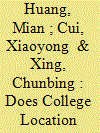| Srl | Item |
| 1 |
ID:
186223


|
|
|
|
|
| Summary/Abstract |
Based on a representative survey of new college graduates in China, we present a job location choice model that allows for a self-selection effect in college regions by considering region-dependent heterogeneous preference for job locations and unobservable location features. We also treat endogenous housing costs using the method developed by Berry et al. (1995). Our estimation results show that college education significantly increases graduates' likelihood of working in the city where their college is located. However, a model that does not consider the self-selection effect overestimates this impact. The impact of college location on a graduate's migration decision varies considerably across cities. There is significant heterogeneity between students from universities of different tiers and rural versus urban areas. Meanwhile, the graduates show a marked home preference when choosing their job locations, and they tend to avoid working in cities with high housing costs. These findings shed light on debates on place-based higher education policies and spatial distribution of human capital with a high level of education.
|
|
|
|
|
|
|
|
|
|
|
|
|
|
|
|
| 2 |
ID:
187876


|
|
|
|
|
| Summary/Abstract |
Almost a quarter of recent college graduates in China are working in jobs that are not related to their college major—mismatched—due to various reasons. In this study, combining administrative records with survey data on a large sample of college graduates from the class of 2019 in a central province of China, we provide, to the best of our knowledge, the first evidence on the effects of different types of mismatches on a variety of labor market outcomes among recent Chinese college graduates. To address the endogeneity problem associated with mismatch, we use a variety of proxies for individual ability and resources, employ the propensity score matching strategy, and use the bounding analysis to examine the extent to which our estimates are sensitive to unobserved influences. Results show that workers who are mismatched due to personal interests (interest-mismatched) have better labor market outcomes than other types of mismatched workers, as well as matched workers, in terms of higher probabilities of getting promoted and receiving on-the-job training. Of all mismatched workers, skill-mismatched workers (mismatched due to a lack of skills) and demand-mismatched workers (mismatched due to jobs in related fields being unavailable) are associated with lower probabilities of job satisfaction, promotion, and job stability. Results from identification strategies reveal some evidence of selection on observed variables and some evidence of sample selection, but our findings remain consistent and most estimates are robust to a potentially relatively large influence of unobserved heterogeneity. Further analysis demonstrates some gender differences in the estimated effects of different types of mismatches on labor market outcomes.
|
|
|
|
|
|
|
|
|
|
|
|
|
|
|
|